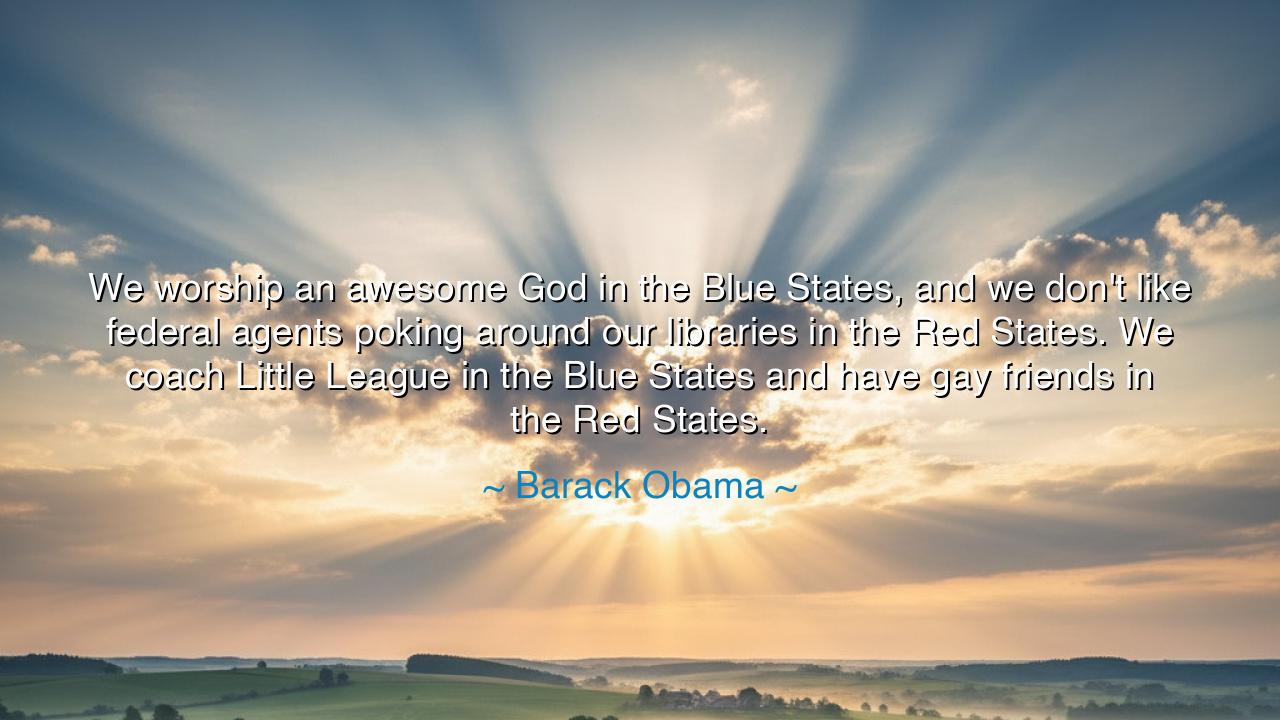
We worship an awesome God in the Blue States, and we don't like
We worship an awesome God in the Blue States, and we don't like federal agents poking around our libraries in the Red States. We coach Little League in the Blue States and have gay friends in the Red States.






The words of Barack Obama echo with both insight and subtle humor: “We worship an awesome God in the Blue States, and we don’t like federal agents poking around our libraries in the Red States. We coach Little League in the Blue States and have gay friends in the Red States.” Spoken during the early years of his political career, this statement is more than a commentary on geography or politics—it is an exploration of the complex tapestry of American life. Obama observed that the nation is woven from diverse communities, each with its values, contradictions, and unique character. His words invite reflection on unity, empathy, and the courage to embrace both difference and common humanity.
The origin of this quote lies in a 2008 campaign speech in Unity, New Hampshire, where Obama sought to bridge the divides that had long split his country. He recognized that Americans cannot be reduced to caricatures of ideology. Those in the “Blue States” were seen as religious yet tolerant, civic-minded yet cautious of authority, while those in the “Red States” were perceived as private, protective, and deeply connected to community life. By juxtaposing behaviors, friendships, and values across these symbolic boundaries, Obama highlighted the shared humanity that defies simplistic categorization.
At the heart of this statement is a profound truth: the human spirit cannot be neatly confined. People are full of paradoxes, holding beliefs that may seem contradictory yet coexist in harmony within their hearts. Just as the ancients taught that virtue lies in balance, Obama’s words remind us that communities, like individuals, contain multitudes. A Red State may be conservative in politics but rich in personal empathy; a Blue State may embrace modernity yet cherish faith and tradition. The lesson is that to understand others, we must look beyond labels and see the living mosaic of values, experiences, and relationships.
Consider historical parallels that illuminate this wisdom. During the Civil Rights Movement, communities across the South contained both champions of justice and defenders of segregation. Some of the most courageous allies were found in unexpected places—clergy, teachers, and neighbors who quietly defied injustice while maintaining faith in their own traditions. Similarly, Obama’s observation underscores that character and morality are not determined solely by political affiliation, but by the choices people make to nurture community, friendship, and conscience.
This quote also carries an emotional resonance in its subtle celebration of diversity and tolerance. Coaching Little League, having gay friends, worshipping God—all these ordinary acts reveal the extraordinary truth that compassion and engagement transcend ideology. They are the threads that bind society together, even in moments of political tension. Obama recognized that these small, personal expressions of humanity are as significant as formal laws or political victories, for they sustain the moral and social fabric of the nation.
Furthermore, Obama’s metaphor of federal agents and libraries reflects a tension between authority and liberty, surveillance and privacy. It reminds us that vigilance in the defense of civil liberties is not limited to one region or one ideology. Wisdom, he implies, is found in acknowledging that every community has its own values, and that true governance requires respect for these differences while fostering mutual understanding. The state must protect, not dominate; it must serve, not alienate.
The lesson for our lives is clear: embrace empathy, celebrate contradictions, and seek understanding beyond labels. In friendships, in communities, in workplaces, and in families, one must recognize that people are richer than their politics, and that moral insight often lies in ordinary acts of love, respect, and courage. To reduce humanity to partisanship is to blind oneself to the full depth of life. Obama’s words are a call to cultivate awareness, to honor differences, and to find unity in shared human experience.
Thus, the words of Barack Obama endure as a meditation on human complexity and societal harmony: “We worship an awesome God in the Blue States, and we don’t like federal agents poking around our libraries in the Red States. We coach Little League in the Blue States and have gay friends in the Red States.” Let them remind us that wisdom lies in observation, humility, and connection. Seek to see beyond surface divisions, act with compassion, and honor the intricate, sometimes contradictory, but always human truths that bind us together. In this understanding, society flourishes, and the soul grows in courage, empathy, and insight.






AAdministratorAdministrator
Welcome, honored guests. Please leave a comment, we will respond soon